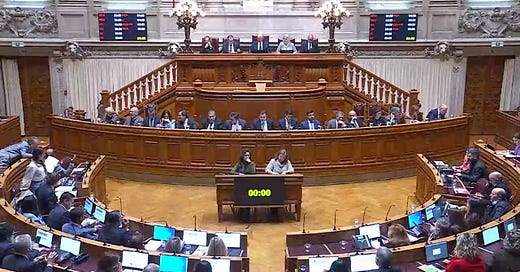Government Proposes Changes to Non-Residents' Access to the SNS
The Government argues that the proposal, presented on Thursday, strikes a balance between safeguarding public resources and maintaining the country’s humanitarian values.
What?
Prime Minister Luís Montenegro announced on Wednesday in Parliament his Government’s plans to amend healthcare legislation to prevent alleged abuses of the National Health Service (SNS) by non-resident foreigners.
The proposal, which he said aims to “correct access” to the SNS, was presented on Thursday by the ruling Social Democratic Party (PSD).
Hugo Soares, leader of the PSD parliamentary group, emphasized that the proposed changes aim to ensure that healthcare services are reserved for those with legitimate needs without compromising Portugal’s humanitarian values.
The initiative, co-sponsored by the Christian Democratic (CDS) party, includes amendments to the foundational Health Law. If passed, the changes would introduce mechanisms for better monitoring and preventing misuse of healthcare services.
Montenegro emphasized that while no individual in need would be denied medical care, the Government must combat exploitation by “organized networks” that abuse the system’s humanistic principles.
“Indeed, we have a problem in Portugal regarding access to our healthcare facilities, to the National Health Service, with some foreign citizens seeking services that the Portuguese State, in good faith, provides, but which are being exploited by organized networks and, therefore, involve fraudulent practices that take advantage of the humanitarian principles of our laws,” stated the Prime Minister.
Immigration and Workforce Challenges
In a debate dominated by migration, Pedro Nuno Santos, leader of the Socialist Party (PS), called attention to labor shortages in sectors critical to Portugal’s economy, including construction, agriculture, and tourism.
Santos criticized the government’s termination of the “manifestation of interest” system, which previously facilitated the entry of immigrant workers.
Santos argued that eliminating this system has exacerbated workforce shortages, threatening projects funded by the Recovery and Resilience Plan (PRR).
He demanded clear solutions to expedite the recruitment of foreign workers, pointing out that the absence of an alternative framework has left key sectors in disarray.
Montenegro defended the Government’s stricter requirements for work visas, arguing that they ensure proper integration and employment. He emphasized the importance of targeted immigration policies, which prioritize workers with confirmed job offers and provide support such as housing access.
Santos countered that the work visa requirement already existed under previous laws and accused the government of creating unnecessary complications.
He also criticized the handling of 118,000 immigration applications rejected under the new system, questioning the fate of these individuals amid the country’s pressing labor needs.
AIMA faces a surge of court cases
Meanwhile, Ana Celeste Carvalho, a Supreme Administrative Court judge made headlines this week by stating that there over 900 injunctions are being filed daily against AIMA for violations of rights, freedoms, and guarantees.
Carvalho made these remarks during an event in Porto celebrating the 20th anniversary of Portugal’s Administrative Justice Reform.
This flood of cases has exacerbated delays in administrative courts, already the slowest in Portugal's judicial system.
Carvalho attributed the situation to poorly planned public policies, noting the lack of additional resources to cope with the increasing caseload. At the Lisbon Administrative Court alone, some judges are reportedly handling over 5,000 cases.
Carvalho warned that such congestion could result in a denial of justice and urged the Ministry of Justice to hire more assistants to support judges at the first-instance administrative courts.
The urgent cases against AIMA demand compliance with the legal deadline of 90 days to decide on residency permit requests but do not dictate the outcome of these decisions.
In June, the government revealed that AIMA had a backlog of approximately 400,000 pending cases. Recent efforts have resolved 231,000 cases—113,000 approvals and 118,000 rejections—yet the strain on courts remains severe.
Since September, 20 new service centers with a combined capacity to assist 5,000 immigrants daily have been opened, aiming to eliminate the backlog by June 2025.
Government Responds to Immigration Backlog
Last week, the Minister of the Presidency António Leitão Amaro highlighted efforts to address the AIMA backlog, with the agency now assisting 5,000 immigrants daily. Of the 400,000 unresolved cases identified in June, 113,000 have been processed, and 108,000 rejected.
“This backlog reflects a heavy inheritance of flawed immigration policies, such as an open-door approach and the dismantling of SEF, which left the State paralyzed,” Leitão Amaro stated in an interview with Público and Renascença.
He emphasized the importance of clearing the backlog for both immigrants and Portuguese society, noting that unresolved statuses deprived immigrants of access to housing and employment, leaving their lives in limbo.
Looking ahead, the Minister expressed optimism that the regularization process would stabilize by summer 2025.
He also announced plans to meet with business confederations to establish a streamlined migration system, emphasizing rapid processing, effective control, and employer accountability for regular labor migration.





As usual, enlightening!
Regarding SNS, would like to learn more and have examples of the alleged exploitation by “organized networks” that abuse the system. Thanks!
Since when is anyone even able to access SNS services, much less abuse them? This is using fly spray when your house is falling down, as usual.